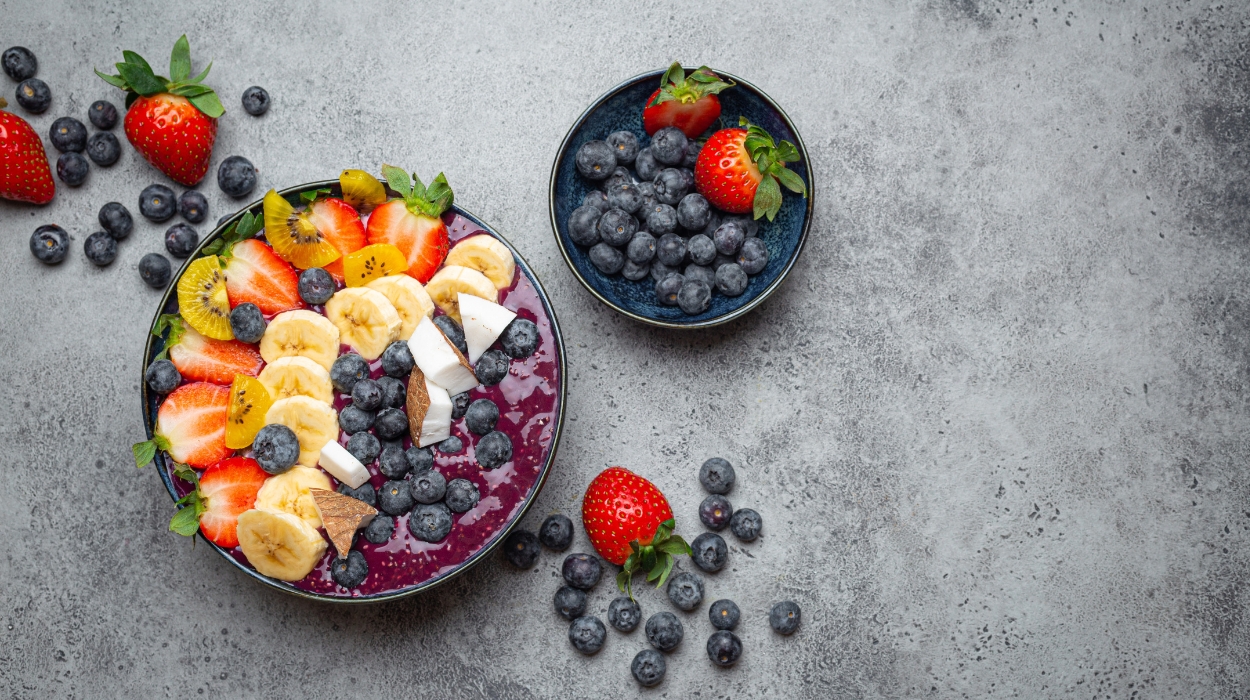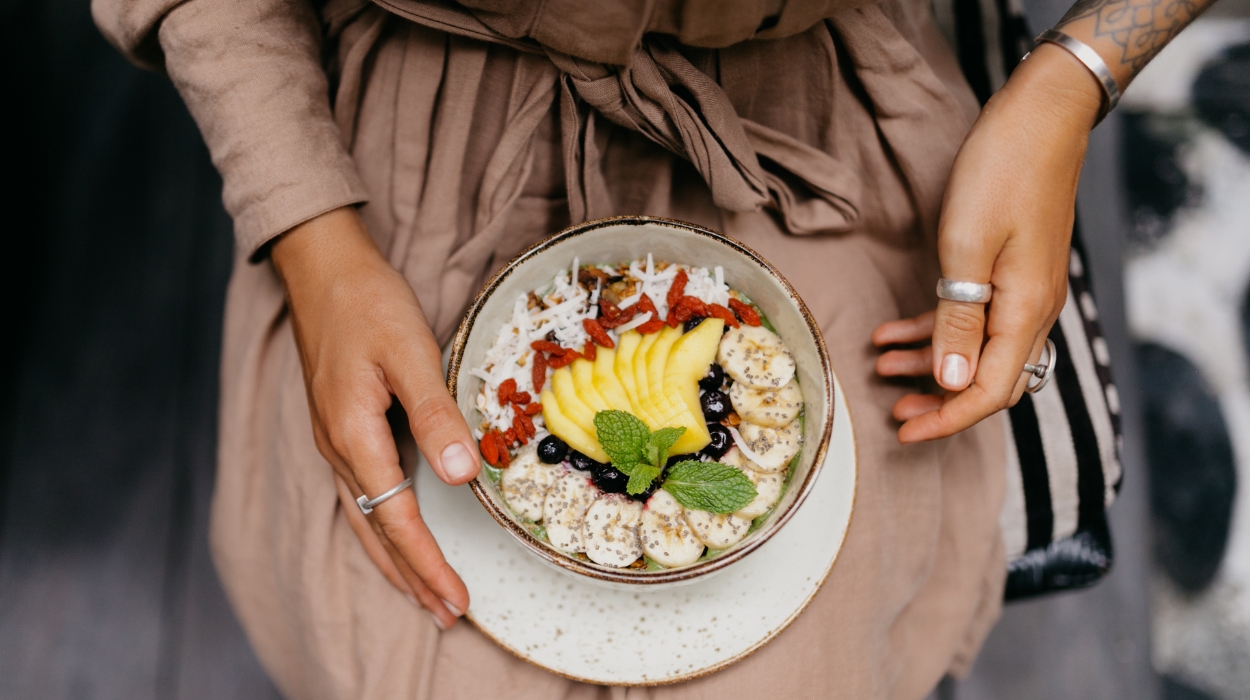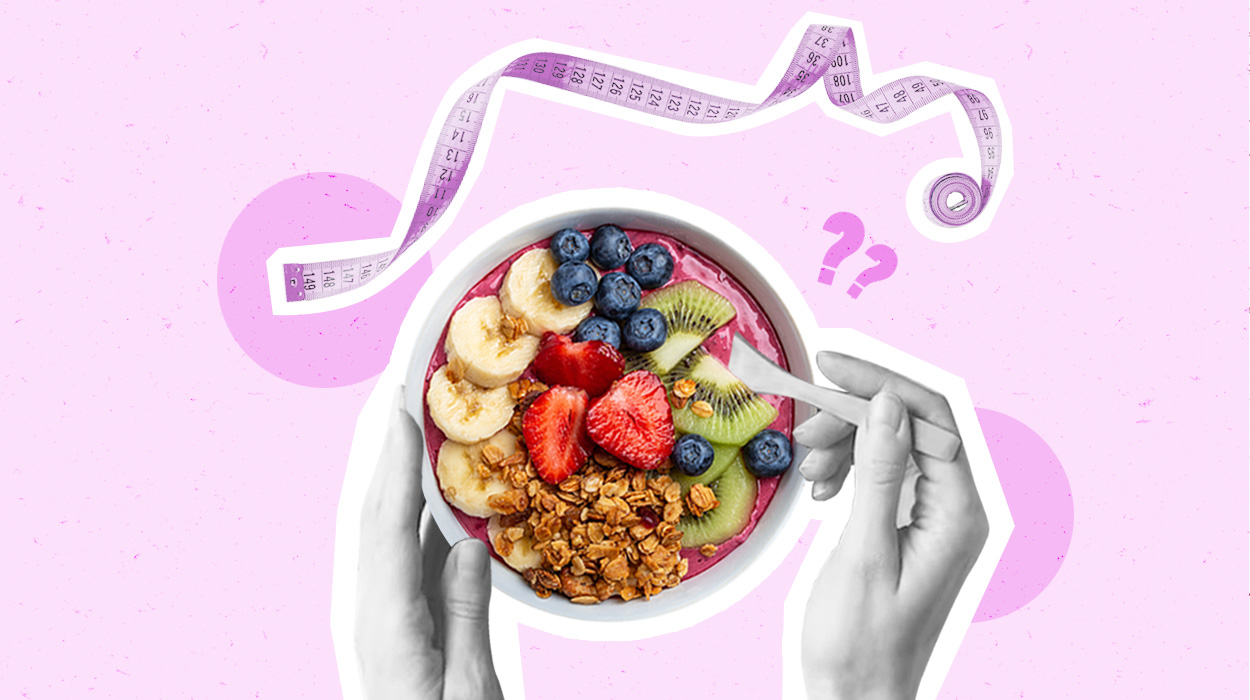Acai bowls are colorful and tasty, so it’s no surprise they’ve blown up on social media. They’re made with acai berry pulp and other healthy ingredients like frozen fruits, seeds, coconut flakes, and nut butter.
The acai berry is low in sugar, high in vitamins and antioxidants, and might provide an array of health benefits — from promoting brain function to fighting heart disease. But are acai bowls good for weight loss?
In this article, we’ll look at how acai bowls affect your weight. Read on to learn how to make a tasty acai bowl and the healthiest way to enjoy it for weight loss.
Are Acai Bowls Good For Losing Weight?
It depends. There’s no direct evidence that acacia berries are good for weight loss. However, you can add a few ingredients like chia seeds and bananas to your acai bowl, which may boost your weight loss efforts.
So, while an acai bowl is not enough alone to help you lose weight, it can supplement a good weight-loss diet plan.
Are Acai Bowls Good For Weight Loss?

Before we dive into whether acai bowls are good for weight loss, we should look at their composition and health benefits.
An acai bowl is a mixture of ingredients, often fruits, grains, and coconut, that uses acai berries as the base ingredient. There’s no limit to how many ingredients you can use in an acai bowl, but sliced bananas and other fruits, coconut flakes, and chopped nuts are the most popular.
Acai berries come from the acai palm, which is abundant in the Amazon region. They have been a food source in South America[1] for centuries before becoming popularized in the West.
Can They Help With Weight Loss?
So, how might an acai bowl affect your weight? While many health-food supplement sellers hype up the weight loss benefits of acai bowls, there’s no direct evidence that acai berries help you burn calories faster or help you lose weight.
That said, an acai bowl can be a healthy snack choice to aid weight loss — depending on its ingredients.
Acai Bowls & Weight Loss: What’s The Relationship
While acai berries have no proven weight loss benefits, acai bowls may help you lose weight in several ways.
Firstly, acai bowls can help prevent exercise-induced muscle damage[2] and hence speed up post-exercise recovery. This encourages you to keep exercising, supporting your weight loss journey.
Secondly, you can add ingredients known to aid weight loss. For instance, include chia seeds to reap their weight loss benefits.[3]
Moreover, if you have an acai bowl for breakfast, you might be more motivated to continue eating healthy meals throughout the day.
How Healthy Is An Acai Bowl?
The acai berry is high in antioxidants,[4] fiber, and micronutrients like manganese and potassium. However, the overall nutritional composition of an acai bowl is determined by its other ingredients.
Since frozen fruits are the main ingredients, an average acai bowl is rich in multiple other vitamins. Acai bowls often feature other fruits like bananas, blueberries, and strawberries, which are rich in other nutrients[5] like vitamin C. Plus, frozen fruits tend to be higher in vitamins than fresh fruits, making acai bowls even healthier.
Your own acai bowl will be different and will likely be healthier than a commercial one. Still, a 170-gram serving of a commercial acai bowl is likely to have the following nutrients:[6]
- Energy: 211 calories.
- Total fats: 6 grams.
- Of which saturated fat: 2 grams.
- Dietary fiber: 7 grams
- Carbs: 35 grams
- Protein: 3 grams
- Total sugars: 19 grams
- Of which added sugars: 11 grams
- Potassium: 270 milligrams.
How Many Calories In An Acai Bowl?
If you’re making the acai bowl yourself, you have complete control over which ingredients to use and how much. Therefore, you can avoid high-calorie toppings and keep the bowl low-calorie.
Even a 170-gram commercial acai bowl[5] only provides 211 calories, making it a great healthy snack. However, they can also have as much as 11 grams of added sugars and two grams of saturated fat per 170-gram serving. Added sugars are one of the worst health offenders in today’s society, increasing the risk of diabetes and other lifestyle diseases.[6]
Are Acai Bowls Fattening?
If you’re still wondering: do acai bowls make you fat? The answer is that it depends.
While acai fruit is not linked to weight loss or weight gain, acai bowls can be made with high-calorie toppings. This can increase your daily calorie intake and might lead to weight gain if you consume more than the energy you expend.
However, typically, homemade acai bowls are made with good stuff, like low-calorie frozen fruits, including bananas and acai fruit. But it depends on your toppings preferences. If you like honey and granola on top of your acai bowl, the extra calories might put you over your recommended daily calorie intake. Over time, this will lead to weight gain.
Whether your acai bowl leads to weight gain or not also depends on portion sizes.
In addition, some commercial acai bowls have added sugars, which can contribute to weight gain[7] and health complications.
Top Health Benefits Of Acai Bowls
As discussed above, acai bowls are very nutritious. It’s therefore not surprising that they have a host of health benefits. Let’s look at the main ones.
They Can Boost Your Brain Function
Several studies suggest that acai berries are good for cognitive function.
One animal study[8] suggests that acai berries might mitigate dementia in mice brains. The fruit was even found to reduce anxiety and improve memory in another animal study.[9]
Although we don’t yet have much research on humans, these findings might make acai bowls healthy and beneficial for elderly people experiencing memory problems.
They Might Have Anti-cancer Properties
Cancer was responsible for 10 million deaths in 2020.[10] Therefore, any small step you take to protect yourself against this deadly group of diseases is essential.
Fortunately, a few studies have revealed some anti-cancer properties in acai fruit. For instance, acai pulp may reduce colon[11] cancer risk in mice, and acai extract may reduce breast cancer[12] cell growth. However, another study[13] suggests that acai fruit may not help prevent stomach cancer in those with increased risk.
While more studies are needed to prove the anti-cancer effects of acai fruit, the existing ones give researchers a glimpse of hope.
They’re Rich In Antioxidants
Antioxidants are essential in neutralizing the damage caused by free radicals in the body. If left unneutralized, free radicals can damage your body, leading to diseases like cancer.[14]
Acai bowls are made with fruits like acai, cranberries, and blueberries, which are all rich in antioxidants.[15] Dark chocolate is also rich in polyphenols,[15] plant compounds that have antioxidant properties. If added chocolate, go for raw unsweetened chocolate or cacao nibs.
Tips For Making And Eating

There are different ways to make and enjoy an acai bowl. Below, we’ll look at tips on making a healthy acai bowl to supplement your weight loss efforts.
Making An Acai Bowl That Helps You With Weight Loss
If you’re on a weight loss diet plan, you must ensure that all your meals are healthy to maintain a calorie deficit. An acai bowl makes an excellent healthy snack because it’s nutrient-dense and low-calorie.
Before you start making an acai bowl, find out how much fiber you need per day to lose weight. If you’re not getting enough from your diet pill or plan, increase your acai bowl’s fiber content with extra whole grains, chopped nuts, or other fruit.
Here are a few things you can do to supplement your weight loss diet with an acai bowl:
Make The Acai Bowl Yourself
Commercial acai bowls often have artificial additives and added sugar. This means they’re higher in calories, which can be detrimental to weight loss.
Making your acai bowl yourself allows you to choose what to include and leave out. You can ensure that it has all the nutrients you need and has no added sugar.
Add High-Protein Ingredients
Proteins like chia seeds or natural peanut butter can help reduce the impact your acai bowl has on your blood sugar levels[16] and stabilize your blood sugar. Eating more protein helps increase feelings of fullness,[17] preventing you from consuming more calories from other foods.
Blend the frozen pulp and fruits with milk, non-dairy milk, or yogurt to increase the protein content. You can also use almond milk, which tends to be lower in calories than other milk varieties.
Choose Your Toppings Wisely
To lose weight, it’s best to stick to one or two low-calorie toppings. Go easy on natural sweeteners like honey, which add to the high sugar content. If adding healthy fats such as nuts or unsweetened chocolate, stick to portion sizes and don’t go overboard.
Moderate Your Servings
Avoid making a massive acai bowl. While acai bowls are nutritious and healthy, the typical serving size should not exceed one cup. This will ensure you have enough without taking too much sugar in one sitting.
One of the best ways to have a balanced and moderate serving is to list all your ingredients before making the acai bowl. Then, determine how much of each you need and add them accordingly.
Add Veggies
Don’t want so much natural sugar in your bowl? Try replacing some fruits with greens like kale or spinach. These can add other health-promoting nutrients like beta-carotene. New evidence suggests that carotenoids[18] might even promote weight loss.
Conclusion
While most commercial acai bowl marketers will promise fast weight loss results, acai berries haven’t been proven to have significant weight loss benefits. However, a healthy acai bowl can be a good healthy snack to supplement a weight-loss diet plan.
Acai bowls are high in antioxidants, vitamins, and minerals, providing many health benefits. They’re also easy to make.
You can also add helpful ingredients like chia seeds and bananas to your acai bowl to boost your weight loss efforts. Therefore, acai bowls can make your weight loss journey easier.
Frequently Asked Questions
Yes. It’s okay to eat an acai bowl every day. However, if you’re on a weight loss journey, determine how many carbs a day you should aim for to lose weight.
There are no restrictions on adding ingredients to an acai bowl. Add the fruits that align with your nutritional goals. If you want to lose weight, add low-sugar fruits such as blueberries or strawberries and high-fiber toppings like chia seeds.
A homemade acai bowl is healthier than ice cream. It’s packed with nutrients and antioxidants, which are better for your health. However, commercial acai bowls are sometimes loaded with added sugar or sweeteners, making them as unhealthy as ice cream.
One of the main benefits of homemade acai bowls is that they’re made from healthy ingredients. This makes them a better snack than commercial snacks. On the other hand, acai bowls have high levels of natural sugars.
Generally, acai bowls are made from low-calorie fruit like strawberries and bananas. However, commercial variants might use high-calorie toppings like honey and granola, which can increase calories.
 Evidence Based
Evidence Based

